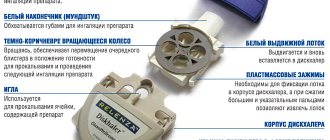Ribavirin is one of the main drugs used to treat chronic and, in some cases, acute hepatitis C. The official instructions for use generally describe its use for a variety of viral infections. Until recently, the drug was prescribed only as part of one regimen: in combination with standard interferons or peginterferon (a long-acting drug that is administered once every 7-10 days).
- International nonproprietary name (INN): Ribavirin.
- Name of the substance in Latin: Ribavirinum.
- ATX code: J05АВ04. Registration numbers are assigned to medicines containing ribavirin and are indicated in the RLS (register of medicines registered in Russia).
- Pharmacotherapeutic group. The substance is classified as an antiviral agent (based on its therapeutic effect) and a synthetic analogue of nucleosides (based on its chemical structure).
In accordance with modern methods, therapy for HCV infection is carried out without interferon, only with the use of direct antiviral drugs. But the opinion of hepatologists regarding the exclusion of ribavirin from hepatitis C treatment regimens is ambiguous. Sometimes prescribing the drug in combination with direct-acting antiviral drugs can achieve a rapid virological response.
Release form and manufacturer
Ribavirin is a synthetic antiviral medicine that fights the hepatitis C virus (HCV). Available in several dosage forms:
- tablets with 200 mg of active substance, 10, 20 and 50 pcs. in 1 package;
- lyophilisate for injection into a vein, in ampoules of 1-3 ml with 100 mg and bottles with 500 mg of the active substance;
- capsules with 100 or 200 mg of active ingredient, 20, 30, 42, 60 or 100 pcs. in 1 package.
Until the beginning of 2005, Ribavirin was produced in the United States by the pharmaceutical company Schering-Plough. A little later, a medicine with the same active substance began to be produced by the pharmaceutical company Roche Pharmaceuticals under the name Copegus. The first generics of Ribavirin appeared in the USA. Three Rivers Pharmaceuticals and Par Pharmaceutical have received licenses to produce the antiviral drug.
In the Russian Federation, generics of Ribavirin are produced by different pharmaceutical companies - Vector Medica, Canon-pharma, Vero-pharm, Vertex.
Price and where to buy
Medicines are available for sale in pharmacies, so there is no problem where to buy the medicine in Russia. The price in Moscow and St. Petersburg may be slightly higher than the cost of the medicine in other cities. You can save by pre-ordering online.
You can find out how much a particular drug costs, whether the product is in stock and find out delivery conditions by phone. In pharmacies in Moscow and St. Petersburg, the price of ribavirin 200 mg is about 1,300 rubles. You can buy 400 mg tablets at a similar cost. Foreign drugs should be ordered only from reliable online pharmacies.
Composition and effect of the drug
Ribavirin contains the active substance of the same name. It belongs to synthetic analogs of nucleosides that have high antiviral activity against RNA and DNA viruses. The mechanism is to block the transfer of genetic information between virions:
- the drug molecule is included in the RNA of the pathogen instead of nitrogenous bases - guanine, adenine;
- pairs are formed with the amino acids cytosine and uracil;
- During HCV replication, mutations occur that interfere with the biosynthesis of daughter virions.
Active metabolites of Ribavirin block the synthesis of protein components of the hepatitis C pathogen. Therefore, over time, the viral load on the affected liver decreases.
More than 45% of the active substance is absorbed into the blood from the gastrointestinal tract. With parallel intake of fatty foods, its bioavailability reaches 75%. In blood serum, drug components are transported by nucleoside transporters.
According to the results of clinical trials, Ribavirin monotherapy for viral hepatitis C does not lead to recovery. Liver histology does not improve even with a course of medication for 6 or 12 months. To achieve a sustained virological response (SVR), Ribavirin is combined with interferons or DAAs.
When is Ribavirin therapy prescribed?
The antiviral drug is used in combination therapy for hepatitis C together with recombinant alpha-2b interferon, protease or HCV protein inhibitors. It is used in the treatment of such viral infections:
- measles;
- chicken pox;
- rabies;
- genital herpes;
- herpetic stomatitis;
- respiratory syncytial infection;
- hemorrhagic fever;
- indolent hepatitis C genotype 2 or 3.
In England and the USA, Ribavirin is combined with pegylated interferons in the treatment of hepatitis C. This combination is considered the standard of therapy.
Manufacturer
In different countries, the product is available under certain trade names, which are usually patented and can only be used by one pharmaceutical company.
Abroad, the production of drugs containing ribavirin is carried out by:
- Meda Pharmaceuticals, Switzerland;
- Shering-Plough, Belgium;
- Lupine, India;
- Teva Pharmaceuticals, Israel.
Manufacturers in Russia:
- VeroPharm;
- Vertex;
- Pranapharm;
- Pharmproject;
- Ozone;
- Vector-Medica;
- North Star;
- Nizhpharm et al.
The composition of the drugs is identical regardless of the manufacturer. But according to experts, the same name and dosage of the active substance does not mean the same therapeutic effectiveness. Treatment of hepatitis C with ribavirin takes a long time, and it is not recommended to change the drug from one manufacturer to another drug.
Contraindications
This strong antiviral agent creates a serious burden on the detoxification organs (kidneys, liver). It is not used to treat viral hepatitis if:
- hypersensitivity to components;
- decompensated heart failure;
- insulin-dependent diabetes mellitus;
- thyrotoxicosis;
- sluggish kidney failure;
- unstable angina;
- sickle cell anemia;
- thrombophlebitis;
- decompensated cirrhosis of the liver;
- obstructive bronchitis;
- myocardial infarction;
- autoimmune hepatitis;
- pulmonary artery thrombosis.
When treating hepatitis C, the medicine is prescribed with caution to HIV-positive and elderly patients. Ribavirin has a teratogenic effect and is excreted in milk, so it is not prescribed during pregnancy and lactation.
How to take Ribavirin for hepatitis C
Antiviral medicine is used only in combination with DAAs or alpha interferons. Depending on the severity of the condition and the HCV genotype, the effectiveness of therapy ranges from 50-80%. Treatment of hepatitis C with interferon and Ribavirin is carried out for HCV genotypes 1, 2 and 3. The dosage and duration of use depend on the presence of complications and viral load.
In case of chronic hepatitis, therapy is carried out with tableted Ribavirin. The dose is determined taking into account body weight:
- weight up to 75 kg – 1000 mg/day;
- weight more than 75 kg – 1200/day.
When treating genotype 2 or 3 hepatitis and liver cirrhosis, the dose is reduced to 800 mg per day. To prevent irritation of the gastrointestinal mucosa, it is recommended to take the tablets with meals.
The course of treatment with Ribavirin depends on the characteristics of the therapeutic regimen and takes from 12 to 24 weeks. To achieve SVR, the drug is combined with:
- alpha interferons - Pegintron, Altevir, Pegasis;
- PPD drugs – Viqueira Pak, Sofosbuvir and Ledipasvir.
To destroy the causative agent of hepatitis in children, the treatment regimen is drawn up taking into account age and body weight. If the weight does not exceed 47 kg, Ribavirin is taken in the form of a suspension with 40 mg of active substance per 1 ml. The daily dose is 15-16 mg per 1 kg of body weight. The amount of Ribavirin determined by the doctor is divided into 2 doses per day. Due to severe adverse reactions, it is not prescribed to children under 3 years of age weighing less than 10 kg.
Treatment regimens for viral hepatitis in combination with Ribavirin
| Hepatitis genotype | Complications | Drugs with which Ribavirin is combined | Duration of the course, in weeks |
| 1 | — | Interferon (Pegasys) | 48 |
| — | Viekira Pak | 12 | |
| cirrhosis of the liver | Viekira Pak | 24 | |
| — | Sofosbuvir + Pegasys | 12 | |
| 2 | — | Sofosbuvir | 12 |
| — | Interferon | 24 | |
| 3 | — | Sofosbuvir + Pegasys | 12 |
| — | Sofosbuvir | 24 | |
| — | Algeron | 24 | |
| 4 | — | Interferon | 48 |
| — | Sofosbuvir | 24 | |
| — | Pegasys + Sofosbuvir | 12 | |
| 1-4 | cirrhosis of the liver | Sofosbuvir/ Velpatasvir | 12 |
There is no single standard treatment for hepatitis C. The therapeutic regimen is developed taking into account:
- age, body weight;
- HCV genotype;
- presence of complications;
- hepatitis activity.
The dose of interferon depends on its type: recombinant alpha-2b interferon is prescribed subcutaneously up to 3 times a week, 3 million IU, and pegylated - 1.5 mcg/kg once a week. Long-acting drugs are more expensive, but more often lead to lasting results.
Ribavirin® - instructions for use and price
The mechanism of action of the drug is based on inhibition of protein synthesis and RNA of viral particles, which leads to disruption of the ability of viruses to grow and reproduce.
Pharmacological group
The drug is part of a group of direct-acting antiviral drugs used to treat chronic hepatitis C.
Composition of Ribavirin®
The active ingredient Ribavirinm is ribavirin itself, which as a chemical formula is 1-beta-D-Ribofuranosyl-1H-1,2,4-triazole-3-carboxamide.
Auxiliary components of tablets:
- milk sugar (lactose);
- potato starch;
- microcrystalline cellulose;
- croscarmellose sodium;
- magnesium stearate.
Auxiliary composition of capsules:
- potato starch;
- colloidal silicon dioxide;
- microcrystalline cellulose;
- magnesium stearate;
- food gelatin;
- titanium dioxide.
Read further: We study modern methods of rapid treatment of chickenpox
Release form Ribavirin®
The product is produced in the form of:
- yellow hard gelatin capsules of 100 or 200 milligrams of ribavirin each, inside of which there is a white microcrystalline powder with a yellow tint;
- round white tablets of 100 or 200 milligrams of active ingredient;
- lyophilisate for the preparation of a solution for intravenous infusion in glass ampoules of 100 or 500 milligrams of the active ingredient, in the form of a white and yellow microcrystalline powder.
Available in:
- tablets placed in blister packs of 10 pieces, 1, 2 or 5 blisters per box;
- tablets packaged in polymer jars of 100, 140, 200, 280, 500 and 1000 pieces;
- capsules placed in blister packs of 10 pieces of 2,3,4,6 or 10 blisters per box;
- lyophilisate in ampoules with a dosage of 100 milligrams in a volume of 1 or 3 milliliters, 1.5 or 10 pieces per box;
- lyophilisate in ampoules with a dosage of 500 milligrams, 6 pieces per box.
There are many manufacturers of Ribavirin®. Thus, on the shelves of Russian pharmacies you can find drugs produced by:
- Lupine Limited®, India;
- Lab. Novatek®, Cuba;
- Medico GmbH®, Germany;
- Nizhpharma®, Russian Federation;
- Kanonpharma®, Russian Federation;
- Ozon®, RF;
- Vertex®, RF and many others.
The cost of the drug ranges from 770 to 1200 rubles.
Ribavirin® recipe in Latin
The drug is dispensed from pharmacies according to a doctor's prescription, the form for it is filled out depending on the form of release or dosage of the drug.
For tablets:
Rp: Tab. Ribavirin 200 mg
Dtd: No. 10 in tab. DS: Orally 600 mg (3 tablets) twice a day.
For capsules:
Rp: Caps. Ribavirin 200 mg
DTD: No. 20 in caps. S: 600 mg orally (3 capsules) twice a day.
For lyophilisate:
Rp: Ribavirin 500 mg
Dtd: No. 6 in amp. S: Dilute the contents of the ampoule with a solvent and administer intravenously.
Indications for use Ribavirin®
The medicine is prescribed for the treatment of:
- hepatitis C in chronic form:
- HFRS (hemorrhagic fever with renal syndrome);
- rabies (in combination with amantadine, midazole ketamine).
Ribavirin® for hepatitis C is prescribed in tablet form, but is supplemented with interferon injections. To combat hemorrhagic fever, intravenous medications are used.
Contraindications to the use of Ribavirin®
It is prohibited to prescribe the medication to persons with:
- hypersensitivity to any of the components of the product;
- diseases of the thyroid gland;
- diseases of the heart and blood vessels;
- renal failure;
- diseases of the immune system;
- pathologies of the bloodstream (changes in the composition of the blood, thrombophlebitis);
- severe psycho-emotional health disorders (depression, suicidal tendencies);
- pregnant and nursing mothers;
- children under 18 years of age;
- liver cirrhosis;
- myelodepression;
- thalassemia;
- autoimmune pathologies.
Patients over 60 years of age and HIV-positive patients prescribed antiretroviral therapy are treated with caution and under the strict supervision of a physician.
Dosage - how to take Ribavirin®
Tablet forms of the medication are taken whole with meals, washed down with a large volume of liquid. The contents of the ampoules are diluted with a special sterile solvent and administered intravenously in a hospital setting.
The tablets are taken in 2 doses in equal parts, if the dose is not divided in half, the increased dose is left for the evening (2 in the morning and 3 before bed).
Treatment of hepatitis C with Ribavirin® is carried out according to the following regimens. In combination with interferon alfa-2b and taking into account the patient’s body weight:
- up to 75 kilograms – 5 pieces per day;
- over 75 kilograms - 6 pieces per day.
For hepatitis caused by virus genotypes 2 and 3, the drug is prescribed 400 mg twice a day.
The duration of treatment is calculated individually (usually from six to twelve months).
Side effects and effects of Ribavirin®
During treatment with the drug, it is possible to develop undesirable reactions from:
- gastrointestinal tract - loss of appetite, dyspeptic disorders, feeling of dryness in the mouth, pain and bloating in the peritoneum, inflammatory processes of the oral mucosa, liver dysfunction, taste bud disorders;
- neurology - dizziness and headaches, increased fatigue, sleep and consciousness disorders, unreasonable feelings of anxiety, nervousness, psycho-emotional disorders, unmotivated aggression, rarely - increased muscle tone, tremors, numbness and tingling in the extremities, changes in the sensitivity of nerve endings, loss of consciousness, thoughts about suicide;
- respiratory system – cough, difficulty breathing;
- heart and blood vessels - hypertension, hypotension, pulse rate disturbances, cardiac arrest;
- bloodstream - a decrease in the number of main blood cells;
- genitourinary system - menstrual irregularities in women, decreased attraction to the opposite sex, inflammatory processes in the prostate in men;
- sensory organs - inflammation of the ocular conjunctiva, salivary glands, deterioration of visual and auditory functions, auditory hallucinations;
- immune system - allergic rashes, redness, peeling and swelling of the skin, increased sensitivity to ultraviolet rays, bronchospasms, increased body temperature, fever, toxic necrolysis;
- general reactions - joint and muscle pain, focal alopecia, dry epidermis, severe thirst, disruption of the thyroid gland, enlarged lymph nodes, increased sweating, secondary infections, burning and discomfort at the injection site.
Ribavirin® during pregnancy and breastfeeding
The active component of the drug can cause congenital malformations of the child, therefore Ribavirin® is strictly prohibited for pregnant women. Patients are also recommended to plan conception no earlier than six months after the end of therapy.
Studies examining the ability of the active substance to pass into breast milk have not been conducted, therefore, nursing mothers are recommended to interrupt lactation for the entire period of taking the medicine.
Read further: We tell you everything about antibiotics during pregnancy in the 1st, 2nd and 3rd trimester
Compatibility of Ribavirin® with alcohol
Alcoholic drinks are strictly contraindicated for hepatitis C.
The use of Ribavin® and alcohol significantly reduces the effectiveness of the treatment, contributes to the progression of hepatitis and the development of liver cirrhosis, and also increases the risk of developing severe complications from the therapy.
Side effects
Ribavirin is usually well tolerated. If the dosage is followed, unwanted effects occur infrequently. When taking medication in combination with interferons, the liver experiences severe stress, which causes:
- joint pain;
- feverish condition;
- abdominal discomfort;
- losing weight;
- anorexia;
- tinnitus;
- increase in heart rate;
- hair loss;
- insomnia;
- irritability;
- fainting;
- uterine bleeding;
- blurred vision;
- neutropenia;
- headache;
- loose stools;
- lack of appetite;
- nettle fever;
- shortness of breath;
- excessive sweating;
- menstrual disorders;
- fatigue;
- exercise intolerance;
- an increase in the level of bilirubin in the blood.
With long-term treatment of hepatitis with Ribavirin, the risk of inhibition of hematopoietic function, blood disorders and hemolytic anemia increases. No cases of overdose have been reported.
Clinical trial results
Until 2001, ribavirin could only be prescribed in combination with PEG-IFN. The effectiveness of such therapy was noted in 40–50% of patients with HCV genotype 1 and in 80–90% of cases with genotypes 2 and 3. The frequency of severe side effects reached 30%. Replacing interferons with the latest generation antiviral drugs demonstrated positive results in almost 100% of patients. The doctor decides whether ribavirin is needed in addition to sofosbuvir or other antiviral drugs. However, when adding a drug to a therapeutic regimen, not only the effectiveness increases, but the risk of adverse reactions increases.
special instructions
Pregnant and breastfeeding women are not treated with Ribavirin for hepatitis C. The drug has a toxic effect on the kidneys and exhibits teratogenic activity (harms the fetus). Taking tablets by children under 3 years of age is dangerous due to thrombocytopenia, a decrease in the number of leukocytes in the blood. You should stop taking Ribavirin if:
- bleeding gums;
- frequent nosebleeds;
- increasing the time to stop bleeding.
Ribavirin should be prescribed with caution to people with:
- pathologies of the pancreas;
- Graves' disease;
- decompensated cirrhosis of the liver;
- myocardial failure.
To avoid hemolytic anemia, the hemoglobin content in the blood is monitored throughout the course of therapy. Inhibition of the functions of the hematopoietic system is the basis for correction of the treatment regimen.
Metabolites of Ribavirin are not excreted from the body for a long time. Therefore, sexual partners must use barrier contraceptives throughout the entire treatment course. Pregnancy is planned no earlier than 7-8 months after the end of therapy.
How does Ribavirin interact with other drugs?
The components of the drug interact with many drugs from other pharmacological groups. Therefore, before starting hepatitis C therapy, you need to inform your doctor about taking any medications.
What medications does Ribavirin interact with:
- antacids - the bioavailability of the antiviral decreases;
- antiretroviral drugs - increases the load on the cardiovascular system;
- Didanosine and Abacavir - the toxic activity of medications increases 3 times;
- alpha interferons - the antiviral effect is enhanced.
The active components of the tablets are destroyed by ethanol, which reduces the effectiveness of hepatitis C therapy. Therefore, when taking Ribavirin, you should avoid alcoholic beverages.
Which is better, Ribavirin® or Rebetol®?
Rebetol® is a Belgian medicine with the same active ingredient in its composition. Both drugs have almost the same instructions for use, which means they are considered analogues. Rebetol® should also be prescribed together with immunoglobulins, but its great advantage is its use in pediatric practice - it is approved for children from 3 years of age. The disadvantages of Rebetol® include its price - the cost starts from 4,500 rubles.
But the opinion of experts on the question of which ribavirin is better tolerated by the body is clearly the one that is included in Rebetol®. This substance is subject to more complete and deep purification, due to which its bioavailability increases, and the frequency of undesirable reactions decreases several times.
Cost of medicine
Ribavirin is an antiviral medicine that is sold in many pharmacies in the Russian Federation, CIS countries and Europe. Its cost depends on the dosage, release form, and manufacturer.
Approximate cost of the drug for hepatitis C in the Russian Federation
| Release form | Price in rubles |
| capsules 200 mg (60 pcs.) | 800-1150 |
| lyophilisate in bottles of 500 mg (6 pcs.) | 810-860 |
| lyophilisate in ampoules of 100 mg (5 pcs.) | 960-1200 |
| tablets 200 mg (60 pcs.) | 800-1050 |
The original drug is expensive, so hepatitis therapy often includes generics made in Russia or India.
Medicines based on ribavirin
Ribavirin can be purchased in the pharmacy chain under the following names:
- Virazol;
- Rebetol;
- Ribavin;
- Trivorin.
Russian analogues are also available:
- Vero-Ribavirin;
- Devirs;
- Ribamidil;
- Ribapeg et al.
On forums, topics are often created about which is better, Rebetol or Ribavirin. Those who have been treated for hepatitis C cannot name the best drug. According to hepatologists, it is preferable to take foreign-made drugs, possibly in combination with Indian antiviral agents. Domestic analogues are no less effective, but more often cause adverse reactions.
Analogues and alternatives
Many pharmaceutical companies in Europe and Asia have received a license to produce Ribavirin. Analogues of the American antiviral product are 3-10 times cheaper. When treating viral hepatitis the following are used:
- Rebetol;
- Ribavin;
- Moderiba;
- Ribapeg;
- Ribasphere;
- Trivorin;
- Copegus;
- Ribamidil;
- Ribavin-Bio;
- Virazol, etc.
Ribavirin without alpha interferons rarely causes adverse reactions. But if hepatitis is complicated by decompensated cirrhosis, preference is given to interferon-free regimens based on drugs with direct antiviral action:
- nucleoside NS5B inhibitors – Dasabuvir, Sofosbuvir;
- NS3 inhibitors – Telaprevir, Asunaprevir, Boceprevir, Paritaprevir;
- NS5A inhibitors – Elbasvir, Ledipasvir, Pibrentasvir, Daclatasvir, Velpatasvir.
DAAs are easily tolerated because they do not inhibit hematopoietic function and do not provoke a flu-like condition. Prescribed for serious complications - liver failure, decompensated cirrhosis, hepatocellular carcinoma.
Ribavirin is an antiviral drug that is used in combination therapy for hepatitis C. It increases the activity of interferons and DAA drugs. In interferon-free regimens, it is well tolerated by patients and increases the chances of eliminating HCV.
Analogues of Ribavirin®
Analogues of Ribavirin® are the following drugs:
- Ribavirin® LIPINT, Meduna, FPO, SZ, Vero:
- Arviron®;
- Virazol®;
- Virorib®;
- Hepavirin®;
- Copegus®;
- Moderiba®;
- Rebetol®;
- Ribavin®;
- Ribaleg®;
- Ribamidil®;
- Ribaspher®;
- Trivorin®.
Read further: The best effective and inexpensive antiviral drugs for children and adults








